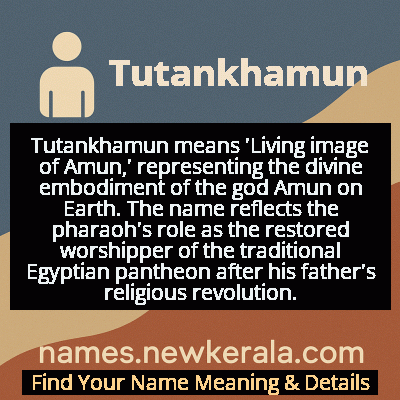Tutankhamun Name Meaning & Details
Origin, Popularity, Numerology Analysis & Name Meaning of Tutankhamun
Discover the origin, meaning, and cultural significance of the name TUTANKHAMUN. Delve into its historical roots and explore the lasting impact it has had on communities and traditions.
Name
Tutankhamun
Gender
Male
Origin
Egyptian
Lucky Number
9
Meaning of the Name - Tutankhamun
Tutankhamun means 'Living image of Amun,' representing the divine embodiment of the god Amun on Earth. The name reflects the pharaoh's role as the restored worshipper of the traditional Egyptian pantheon after his father's religious revolution.
Tutankhamun - Complete Numerology Analysis
Your Numerology Number
Based on Pythagorean Numerology System
Ruling Planet
Mars
Positive Nature
Generous, passionate, energetic, and humanitarian.
Negative Traits
Impulsive, impatient, moody, and can be overly emotional.
Lucky Colours
Red, maroon, scarlet.
Lucky Days
Tuesday.
Lucky Stones
Red coral, garnet.
Harmony Numbers
1, 2, 3, 6.
Best Suited Professions
Military, sports, philanthropy, leadership roles.
What People Like About You
Courage, energy, leadership, generosity.
Famous People Named Tutankhamun
Tutankhamun
Pharaoh of Egypt
Restored traditional Egyptian religion and whose intact tomb discovery revolutionized Egyptology
Name Variations & International Equivalents
Click on blue names to explore their detailed meanings. Gray names with will be available soon.
Cultural & Historical Significance
The 'boy king' phenomenon has made Tutankhamun a symbol of youth leadership and the idea that significant impact isn't limited by age. The mysteries surrounding his death and the subsequent 'mummy's curse' legends have embedded him in popular culture as a figure of supernatural intrigue. His story continues to inspire scientific investigation, including modern DNA analysis and CT scans that have revealed details about his health, lineage, and possible cause of death. Tutankhamun serves as a gateway to understanding broader Egyptian history, making ancient civilization accessible and fascinating to millions worldwide.
Extended Personality Analysis
The name Tutankhamun evokes personality traits associated with restoration, legacy, and historical weight. Individuals connected to this name are often perceived as bridge builders who reconcile conflicting traditions or restore balance after periods of disruption. There's an inherent sense of carrying significant responsibility, often from a young age, suggesting maturity beyond years and the ability to navigate complex cultural or familial expectations. The association with hidden treasures implies depth, mystery, and unexpected resources—qualities that may not be immediately apparent but reveal themselves under the right circumstances.
This name also suggests resilience and strategic thinking, reflecting Tutankhamun's historical role in reversing major religious reforms while maintaining stability. There's a contemplative quality, coupled with the courage to make substantial changes when necessary. The 'curse' legends add an element of dramatic consequence, implying that actions carry weight and may have far-reaching effects. Overall, the personality embodies the paradox of youthful energy combined with ancient wisdom, potential that exceeds initial appearances, and the understanding that legacy is built through both preservation and thoughtful transformation.
Modern Usage & Popularity
In contemporary times, Tutankhamun is virtually never used as a personal given name due to its strong identification with the specific historical figure. The name appears primarily in academic contexts, museum exhibitions, and educational materials about ancient Egypt. The popular nickname 'King Tut' sees occasional use in branding, entertainment, and casual reference, often evoking themes of luxury, mystery, or ancient wisdom. The 2010s saw renewed interest through major exhibition tours and television dramatizations, but this hasn't translated to naming trends. The name remains firmly in the realm of historical reference rather than practical nomenclature, serving as cultural shorthand for archaeological discovery, ancient splendor, and the romance of Egyptology rather than as a viable personal identifier in modern societies.
Symbolic & Spiritual Meanings
Tutankhamun symbolizes the enduring power of legacy and the idea that significance isn't measured by duration but by impact. The name represents hidden treasures waiting to be discovered—both literal archaeological wonders and metaphorical human potential. It embodies the concept of restoration and cultural continuity, serving as a bridge between revolutionary change and traditional values. The young pharaoh's story symbolizes the paradox of fragile mortality contrasted with immortal fame, reminding us that even brief lives can echo through millennia. The legendary 'curse' associated with his tomb adds layers of meaning about consequence, respect for the past, and the potential dangers of disturbing established order. Ultimately, Tutankhamun represents the mystery of what lies beneath the surface—in history, in archaeology, and in human character—and the transformative power of discovery.

